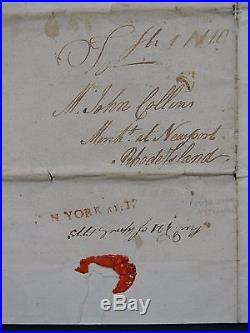
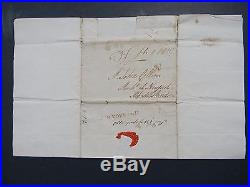
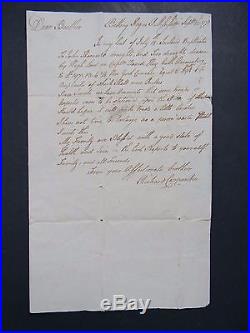
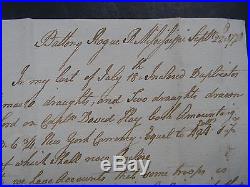
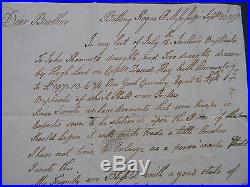
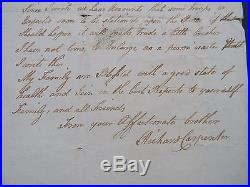
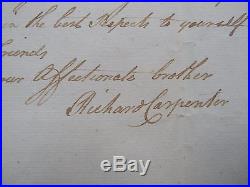
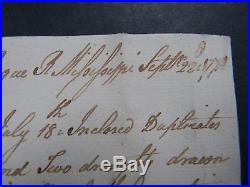
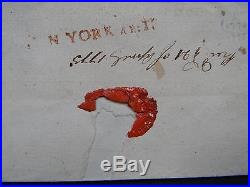
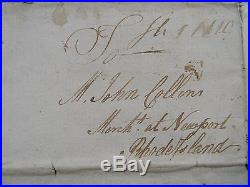
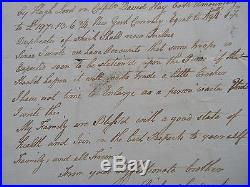
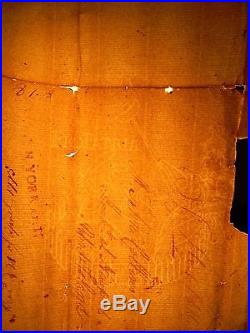

Revolutionary War Stampless folded letter from 1774 written by Richard Carpenter in Baton Rouge to John Collins in Newport. The letter is addressed M. John Collins Merch’t at Newport Rhode Island. ” The letter has red stamped postmark “N YORK AP:18″ and a manuscript cancel “Recd on 21 of April 1775. The letter is dated Battong Rogue A Mississippi Septr. Dear Brother In my last of July 18th Inclosed Duplicates To John Thomas 10 droughts and Two draughts drawn by Hugh Lord on Capt. David Hay both amounting to. My family are Bless’d with a good state of health and I’m in the best respects to yourself, family, and all Friends From your Affectionate brother Richard carpenter. The letter is written on fine hand laid paper, Each page measures 8 x 13 inches. There is a large chip where the letter was sealed otherwise this 243 year old letter from the beginning o the Revolutionary War is in very good condition! John Collins (Continental Congress). John Collins June 8, 1717. March 4, 1795, was the third Governor. From 1786 to 1790. He was the last Independent to serve as Governor of Rhode Island until Lincoln Chafee. He was the son of Samuel and Elizabeth Collins. He stood forth as a staunch advocate of the independence of the Thirteen Colonies. An admirer of George Washington. He was selected by the governor of Rhode Island in 1776 to carry a letter to Washington informing him of the condition of the colony and soliciting counsel upon the best method to adopt for its defense. Later (1782) he was made bearer to the President of Congress. Of a statement of Rhode Island’s reasons for rejecting the Impost Act. During the American Revolution. Rhode Island was for the most part an agricultural area and as such opposed the restrictions of a national government. In 1778, Collins represented Rhode Island in the Second Continental Congress. Where he served until May 1781, when he was superseded by William Ellery. He was, however, re-elected in 1782 and held the position until 1783. Within the state the agricultural interests vigorously advocated a paper currency. Collins espoused their cause and in 1786 was elected governor. It was provided by law that should any creditor refuse to accept the bills of the state the debtor might secure a discharge by depositing the amount of his debt with one of the judges of the state superior court or the court of common pleas. This law led to the suit of Trevett vs. Which resulted in a decision looking toward the right of courts to declare legislative enactments unconstitutional. In 1786 Collins was elected governor of Rhode Island and took office on May 3, 1786. Rhode Island’s ratification of the U. Was inaugurated as President on April 30, 1789 Rhode Island was one of only two of the thirteen original states (along with North Carolina) not to have ratified the United States Constitution and was, technically speaking, an independent nation with Collins as it chief of state. Anti-Federalist elements in Rhode Island, up to 1790, vigorously fought against the calling of a convention to decide upon entering the Federal Union, but in that year (January 17) gave its sanction to such a call by a majority of one vote in the General Assembly. This vote was cast by Collins, who had come to realize the importance of a Federal connection. The vote cost him his popularity and the governorship. He left office on May 5, 1790. The Rhode Island General Assembly ratified the United States Constitution on May 29. Later in 1790 Collins was elected to the 1st Congress. But did not take his seat. Collins was married to Mary, daughter of John Avery of Boston, and his daughter Abigail married John Warren. Collins died at Newport was buried on his farm. , near Brenton Point in that city. His grandson and namesake. (18231887), was a principal of the Virginia School for the Deaf and the Blind. And West Virginia Schools for the Deaf and Blind. The Rhode Island Society of the Sons of the Revolution. Holds an annual observance of Rhode Island Independence Day (May 4) at Governor Collins’ grave. The item “REVOLUTIONARY WAR STAMPLESS FOLDED LETTER 1774 JOHN COLLINS NEWPORT R. I” is in sale since Wednesday, February 15, 2017. This item is in the category “Collectibles\Militaria\Revolutionary War (1775-83)\Original Period Items”. The seller is “armoryantiques” and is located in Providence, Rhode Island. This item can be shipped worldwide.
